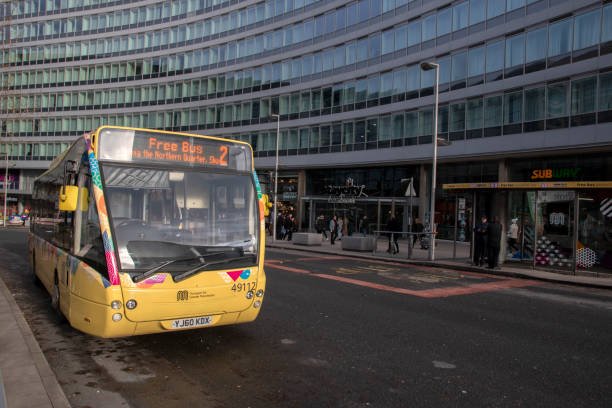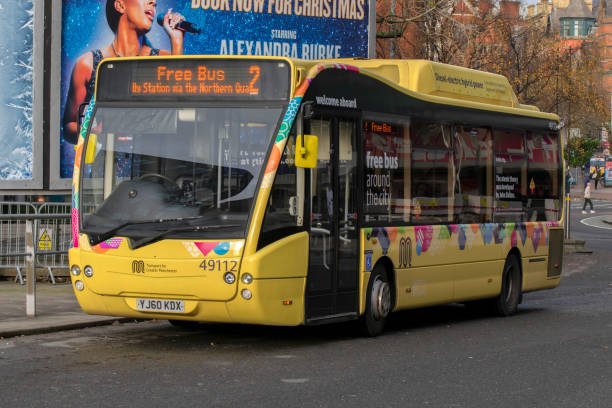Manchester’s public transport network is a lifeline for thousands, but recent bus crashes have cast a spotlight on safety and prompted urgent reviews. Over the past year, two major incidents in the city centre have left residents shaken, families grieving, and officials vowing to improve standards. Here’s an in-depth look at what happened, how the community has responded, and what it means for the future of bus travel in Manchester.
Double-Decker Collision Leaves Seventeen Injured
On a brisk November morning in 2024, commuters on Rochdale Road faced a terrifying ordeal. Two Bee Network double-decker buses collided near Livesey Street, sending debris across the road and injuring seventeen people. Emergency services responded swiftly, with nine ambulances, an air ambulance, and multiple response vehicles dispatched to the scene. Firefighters had to free a passenger trapped on the upper deck, highlighting the severity of the crash.
Most of the injured were taken to hospital, though none were reported to have life-threatening injuries. Among them was Gideon Ingham, a 32-year-old chef, who suffered extensive trauma including neck, back, and leg injuries. He described the moment of impact as “one of the worst pains I’ve ever felt,” recalling how his leg was trapped by the collapsed front of the bus. Gideon now faces months of recovery and uncertainty about his future at work, underscoring the profound impact such incidents have on victims’ lives.
Councillor Pat Karney, who visited the site, described the damage as “unbelievable” and called for a formal inquiry. He raised concerns about the lack of seat belts on buses, noting the distress experienced by passengers during such collisions. The crash prompted Transport for Greater Manchester (TfGM) to launch an immediate investigation and schedule a safety summit with bus operators. Danny Vaughan, TfGM’s chief network officer, stressed that “ensuring the safety of everyone using or working on the Bee Network is our utmost concern”.
Fatal Crash in Piccadilly Gardens: A Tragic Loss
The city was still reeling from an earlier tragedy in October 2023, when a single-decker bus crashed into the T4 bubble tea café in Piccadilly Gardens. The incident claimed the life of 77-year-old Almena Amica, affectionately known as Mena, and injured eleven others. Mena, a beloved family matriarch, died in hospital after sustaining serious injuries.
The bus driver, Khalid Mahmood, 66, pleaded guilty to causing death by dangerous driving. He was sentenced to a two-year suspended prison term and banned from driving for five years. The court heard that Mahmood claimed a vehicle malfunction, but forensic experts found the crash resulted from a failure to engage the brakes.
Mena’s family paid tribute to her dedication to her loved ones and her community spirit. Her sister described the “profound impact” of her loss, expressing gratitude to emergency services and bystanders who rushed to help at the scene. The incident left a deep void in the community and renewed calls for accountability and transparency from bus operators.
Safety Under Scrutiny: Official Response and Public Concerns
These crashes have intensified scrutiny of bus safety in Manchester. TfGM’s decision to convene a safety summit signals a commitment to reviewing protocols and performance standards. The organisation is working closely with emergency services and bus operators to identify causes and prevent future incidents.
Experts have pointed out that, while seat belts are not typically used on buses, their absence can increase the risk of injury during collisions. The high number of casualties in recent incidents has reignited debate about whether additional safety measures—such as improved driver training, stricter maintenance checks, or even seat belt installation—should be implemented on public buses.
Legal experts representing crash victims have also called for greater accountability. Ross Whalley, a Manchester-based solicitor, emphasised the devastating impact of such incidents on victims’ lives and livelihoods, and pledged to seek justice and compensation for those affected.
Road Safety Statistics: The Bigger Picture
While bus crashes are relatively rare compared to other road incidents, they can have far-reaching consequences due to the number of passengers involved. According to the Department for Transport, there were 1,762 casualties involving bus or coach occupants in Great Britain in 2021, a 17% increase from the previous year but still 43% lower than pre-pandemic levels. Overall, road casualty rates have remained broadly stable, but the high-profile nature of bus crashes often draws significant public attention.
In Manchester, the recent incidents have served as a stark reminder that even routine journeys can carry risks. The city’s rapid growth and increasing traffic volumes make it essential to maintain rigorous safety standards across all modes of public transport.
Community Resilience and the Path Forward
Despite the trauma and disruption caused by these crashes, Manchester’s community spirit has shone through. Bystanders rushed to help victims, and emergency services responded with professionalism and care. Families and survivors have shown remarkable resilience, even as they call for answers and improvements.
As investigations continue, there is a collective determination to learn from these tragedies. TfGM’s safety review, coupled with ongoing legal and community advocacy, aims to ensure that Manchester’s buses remain a safe and reliable choice for all.
For now, the city watches closely, hoping that the lessons of the past year will lead to meaningful change—and that the memory of those affected will drive lasting improvements in public transport safety.

Conclusion:
The recent bus crashes in Manchester have highlighted both the strengths and vulnerabilities of the city’s public transport system. While emergency services and bystanders responded swiftly and compassionately, the incidents exposed areas where safety protocols and infrastructure can be improved. The tragedies have prompted thorough investigations, renewed calls for enhanced safety measures, and sparked important conversations about driver support, vehicle maintenance, and passenger awareness.
Manchester’s authorities and transport operators are now under increased pressure to implement meaningful changes that prioritise passenger safety and restore public confidence. As the city continues to grow and its transport network evolves, the lessons learned from these crashes will be crucial in shaping a safer, more resilient future for everyone who relies on Manchester’s buses.
Read More: Bryan Mbeumo: Brentford’s in-demand forward.

